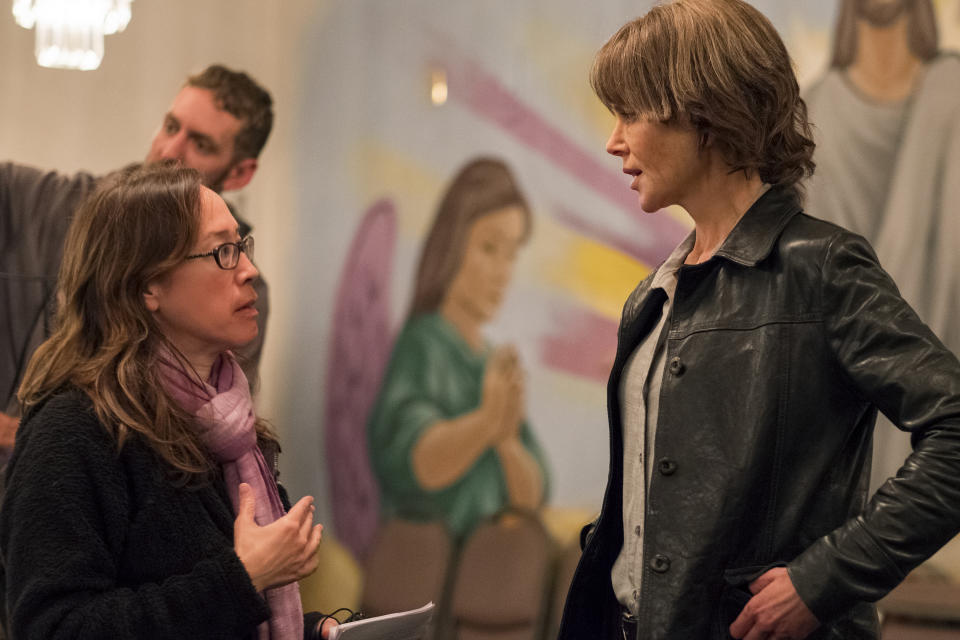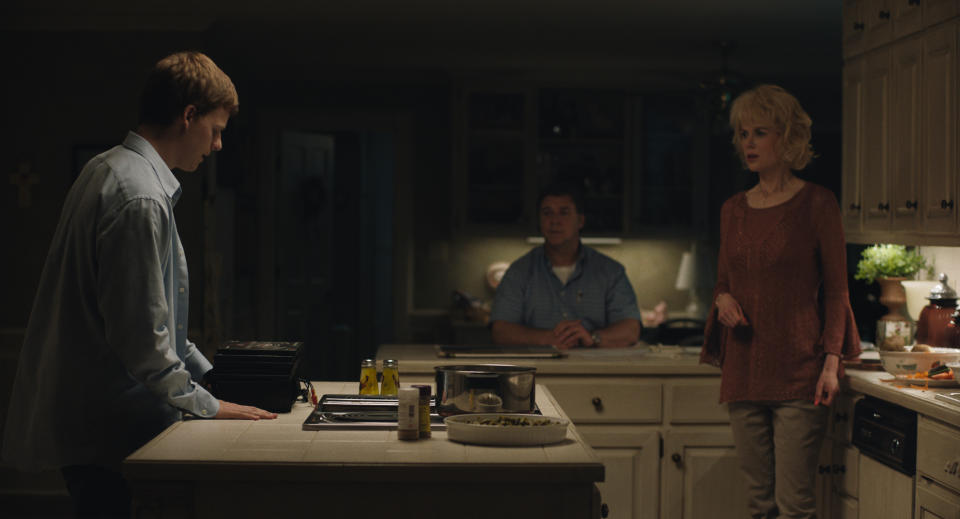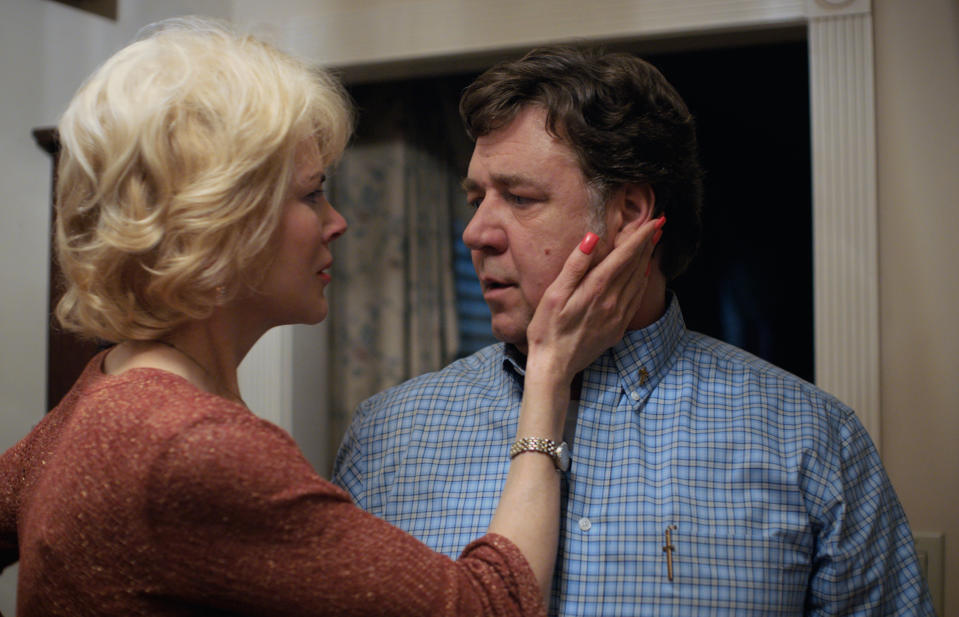Nicole Kidman On Redemption In ‘Destroyer’ & ‘Boy Erased’; The “Awesome Women” In Upcoming Roger Ailes Film

Nicole Kidman is barefoot in a floor-length gown, ice-blue like her eyes. When she curls into a corner of the sofa, she looks relaxed and regal, a woman whose earned the right to stretch after a frantically busy fall. At this moment, her blockbuster Aquaman is topping the box office. You might not expect to see Kidman play an Atlantis queen who accessorizes with a lobster claw, but she’s wanted to work with director James Wan since he caught her eye making low-budget horror films in Australia, which is exactly how she got her own start. Plus, Kidman’s always chosen roles that defy the audience’s expectation of who she is. She veers from prim to savage, comic to terrifying, as impossible to pin down as, well, a woman who goes shoeless in couture.
Take this year’s two other major roles as Boy Erased‘s uptight Arkansas Baptist who wants her hair, and her family, to be picture-perfect, and the embittered cop in Karyn Kusama’s Destroyer, a guilt-ridden, self-destructive mess. Kusama opens the film staring into those pale Kidman eyes, and it still takes several blinks to recognize the four-time Oscar nominee. Either of the roles might score her another nomination—they’ve both got the awards-bait blend of topicality, empathy, and extreme costuming. (The Golden Globes chose Destroyer; the Broadcast Film Critics favor Boy Erased.) But talking to Kidman, she’s not chasing statuettes—she’s chasing what scares her.
Karyn Kusama says you two bonded over how insecure you felt about playing Destroyer. I was surprised to hear that. You still get insecure?
Oh, like terrified. Particularly a role like this because I have no idea. And there’s just that walking onto a set, the expectation, this was so far removed from me. So it’s just like, god, I am really just going to completely be stranded and absolutely dreadful and have people whispering behind my back, like, ‘How did can we get rid of her?’ Honestly! That’s what you worry about as an actress, because it’s a very, very vulnerable place to be, offering up yourself to is this working or not working?
You fought for this role. Why? And why did you want to work with Karyn?
Karyn has two decades of filmmaking experience, so she’s very very educated in film. She has a very particular look, and style and way she loves to work. She’s working on a limited budget so she doesn’t get to make Heat because she doesn’t have the time or resources. But she could absolutely do it. We’re always working within our limitations. How can we do the best we can, given what we’re given? It’s really hard—it’s really, really hard. I think she’s made a great movie. And to be given a role with this kind of complexity, a woman who’s really angry, ashamed, and pissed off. I’m in every frame of the film with those emotions vibrating through me. But ultimately, I’m trying to atone for what I’ve done. I find that emotional: A mother trying to not save her own life, but her daughter’s life.

It’s ironic that the only time you see your character, Erin, happy—which is a flashback to when she’s in love with Chris (Sebastian Stan)—is really, in a way, the saddest scene in the film. You already know how miserable everything is after that moment.
They had a good love, those two. They made bad choices. Erin made bad choices. They both do. But they would have been great together. He was capable of loving her and she was capable of loving him. I think they would have had a great relationship if they had managed to deal with their demons.
I’m guessing you love her, too?
I feel I understand her. And I feel enormous compassion for her because I understand why she makes the decisions she makes. This is someone that’s been dealt a really bad hand in life and is trying to get out of it. She wants to get noticed and be better. But she grew up with an abusive mother, she grew up with no father, she grew up with brothers that would beat her up, she grew up with no money, she grew up just going, I need a break here, come on! God, fate, anything! Give me a break, give me a chance. And then she makes decision after decision that sabotages her chance of getting a break. But I understand why she makes the decisions. And she’s way above and out of her element when she’s put in—and the way she’s put into that situation with going undercover, she’s way too young to be doing that, and she doesn’t have the tools or the backup or the protection. So I suppose as an actor, I can always come in and feel and see why somebody behaves in a particular way. And that’s my job, not to come in with any sort of judgement.
Between Destroyer and Martha in Boy Erased who enrolls her son in a gay conversion camp, you’ve spent the year finding a lot of sympathy for women who make bad choices.
Right, but I think Martha’s choices are out of love. She thinks what she’s doing is actually going to help her son. She doesn’t realize until she’s in there, and then she becomes a tiger and she’s like, Oh no! You see the pain that she feels over that decision, and then you see her rectify it. And their relationship, their real-life relationship, is an incredible inspiration for people that have done things to their children. About how you can heal damage by being accountable. I really believe human beings are allowed to heal. They have to own what they’ve done. But I do think they should be given the chance.
So to you, both of the roles are about making amends.
Yeah, in very different ways. Diametrically opposed in how they look, where they’re from, all of those things, but still they’re both mothers that are trying to heal wrongs with their child. That vibrates in there for me—that’s deeeeep. For parents—not just even mothers—but parents. Even in Aquaman! It’s the same thing because I give my child up in Aquaman! A similar theme runs through everything. Those were the three roles I had this year—yikes!
But for someone like Martha—or Nancy, the real-life mother behind Boy Erased—they first have to break out of their small bubble that keeps them uninformed. Which seems to be a theme right now for the entire country.
That’s how she explains it. She’s like, I didn’t know anything else. And now that I know something else, I want to change it. I think even the reason Nancy let the film be made about her—and let me play her—is her desire to have that change. Nancy said that when she got up at the Toronto Film Festival in front of thousands of people. That’s your story. That’s your mistakes. That’s your son, your family, your husband. And that’s you up there being evaluated and judged on a world scale. I’m stunned at people who allow that to happen. The bravery of people, that is extraordinary. And not to say, let’s do it through rose-colored glasses. She had no control over the movie. She just went: “Go tell the story, I trust you.”


That’s a lot of trust for you to shoulder.
I have that same trust with directors always. I’d much prefer to go into something just going, Yeah, until you prove that you’re un-trustworthy, I’m in there. I’m going to keep giving and giving and giving.
You seem drawn to roles with research and prodding and pushing.
I think for me as an artist, as an actor, it’s always about finding what I can relate to, what I feel now. Because time is precious. Why am I going to give up my time, particularly at this stage of my life, because that’s time that you don’t get back. What am I going to give it to? So my way of contributing and being engaged and being a part of this world is going, OK, I’m going to tell stories. I’m going to artistically commit on the deepest level I can, and I’m going to give a huge part of my emotional self to these roles—or I’m going to dig, dig, dig until I find the way to do that emotionally. But I’m never going to do it half-assed. I’m just trying to give everything I can to it. And that, then, takes time from my loved ones and my life and my family. But that’s the artistic path.
With that in mind, why did you decide to play Gretchen Carlson in Jay Roach’s movie about FOX’s Roger Ailes?
I’m stepping on set tomorrow, so my ability to decipher and talk about it is not possible right now. I’ve been her for a couple of days. I’m not in the film a lot but I’m definitely a huge part of the through line.
Specifics aside, I do love that a story about a sexual harasser is at least turning into a film with so many parts for so many great actresses.
Amazing women. Charlize [Theron] is producing it. We’re here, we’re all in it together, right? So when Charlize calls up, you go, “Yeah, babe, I’m there—I’ll get your back.” And I love that. I love being able to do that for different women. Reese [Witherspoon] and I, we do it on Big Little Lies. We’re a group. We’re very solid, deeply connected, as women. All of us now, because it’s been so long, and we’ve been through so much together. But to join another group of women—Connie Britton’s in it and Allison Janney and Charlize and Margot [Robbie], that’s pretty extraordinary. And Kate McKinnon! I have no scenes with any of these women, but those are pretty awesome women!
So where do you want to focus your energy next?
I don’t know! You tell me? What should I? I need help! Finding more female directors, writers, and putting a lot of work into actually helping Australian female writers get opportunities. I’m always looking to give other women more opportunities, and also young filmmakers, young writers—male or female. If I’m in a position to try to open doors for them, right? Who knows how long that will last, so I’ll try to do that.
Related stories
'Destroyer' Scribes Phil Hay & Matt Manfredi Take Big Swings With Their Portrait Of "Female Rage"
The Bart & Fleming Podcast: The Films That Fueled 2018
Get more from Deadline.com: Follow us on Twitter, Facebook, Newsletter

